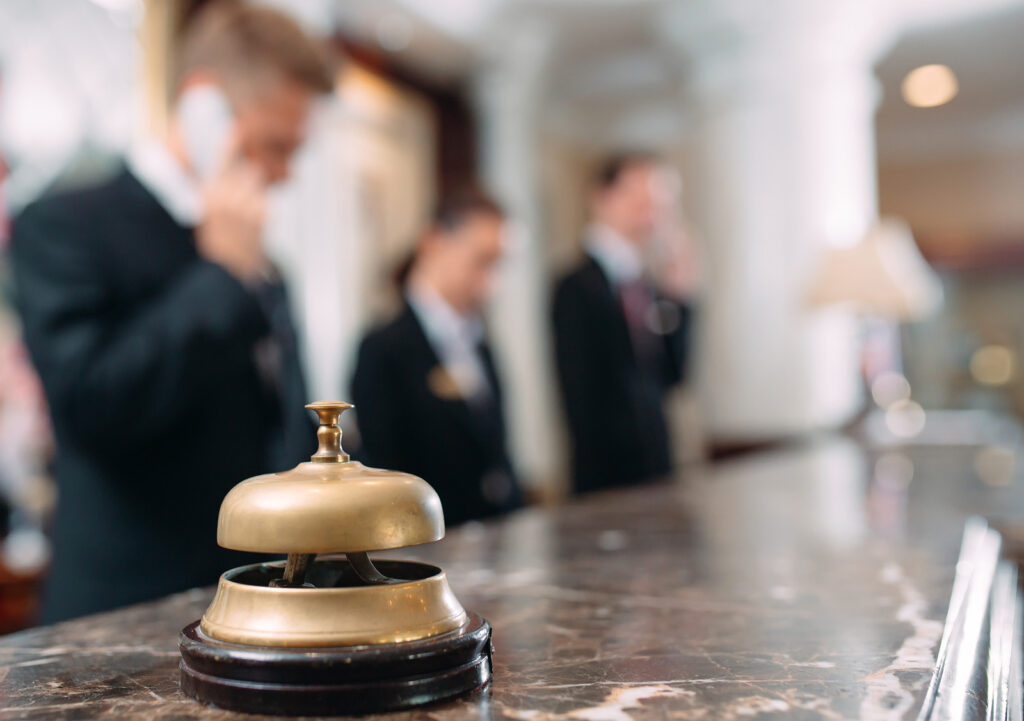How Hotel Phone Systems Go Beyond Traditional Setups
While traditional phone systems serve their purpose in many industries, hotels have unique communication needs that require specialized solutions. Hotel phone systems are designed to cater to the dynamic nature of the hospitality industry, ensuring smooth operations, enhancing guest experiences, and streamlining internal communication.
Room Management
A specialized phone system plays a vital role in enabling efficient room management. It seamlessly integrates with the property management system (PMS), allowing for automatic updates on room status, check-in/check-out times, and guest information. This integration ensures hotel staff have real-time access to room availability, enabling them to promptly assign rooms and provide guests with a hassle-free check-in experience.
Guest Communication
Specialty phone systems facilitate seamless communication between guests and hotel staff, enabling guests to easily request services, make inquiries, or report any issues. Features like personalized greetings, wake-up calls, and voicemail further enhance the guest experience, making their stay more comfortable and memorable.
Internal Communication
Smooth internal communication is essential for coordinating various departments and ensuring efficient hotel operations. Hospitality phone systems offer features such as intercom functionality, group calling, and messaging capabilities, allowing staff members to communicate effectively and respond promptly to guest requests or operational issues.
Emergency Situations
In the event of an emergency, a reliable communication system is crucial for ensuring the safety and well-being of guests and staff. Hotel phone systems often include emergency call features, fire alarm system integration, and the ability to quickly disseminate important information to all rooms for fast and coordinated responses.
Technology Integrations
Hotels are increasingly embracing new technologies to improve guest experiences and streamline operations. A hotel phone system can seamlessly integrate with other hotel technologies, such as guest management systems, mobile apps, and property automation systems, creating a cohesive and interconnected guest experience.
Scalability
Hotels often experience fluctuating communication needs due to seasonal demands and varying occupancy rates. Specialty phone systems are designed to be scalable, allowing hotels to add or remove phone lines or extensions as required without significant disruptions or additional costs.
Cost Efficiency
While specialized hotel phone systems sometimes require an initial investment, they can provide cost-saving benefits in the long run. Features like unlimited calling plans, reduced international calls, and integration with PMS systems enable efficient management of guest communication while keeping costs under control.
Functionality and Customization
Hotel phone systems are designed with the hospitality industry’s specific needs in mind. They offer features like auto attendants, room status integration, call recording, and customized greetings – all tailored to help hotels deliver superior guest experiences.
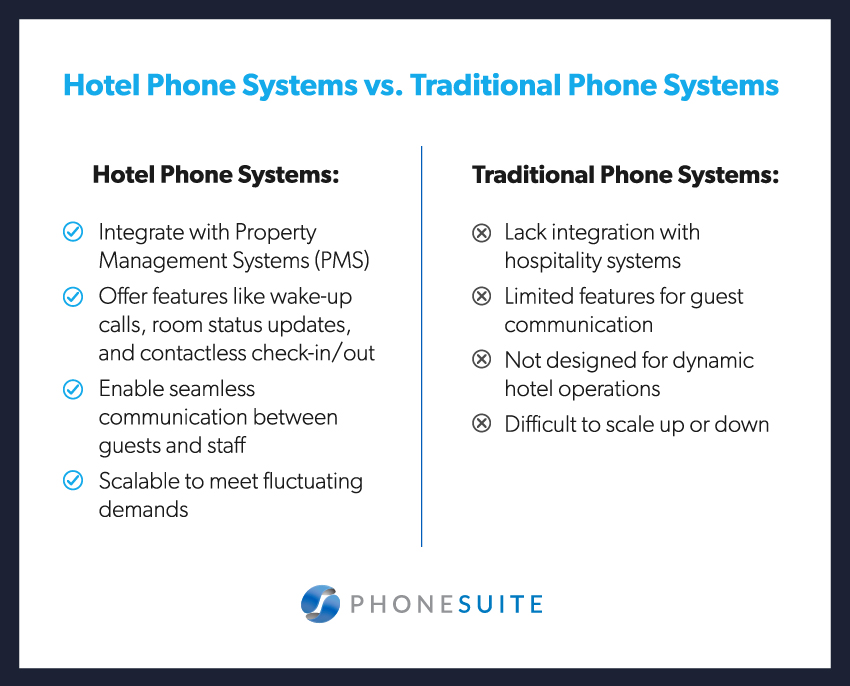
How Do Hotel Phone Systems Work?
Hotel phone systems are built to support both guest-facing services and back-end operations. At their core, they route internal and external calls through a central system – typically a PBX (Private Branch Exchange) – that connects guest rooms, front desk, housekeeping, and other departments. Modern systems often use VoIP technology, allowing calls to travel over the internet instead of traditional phone lines. These systems also integrate with the hotel’s PMS (Property Management System), enabling automated room status updates, personalized greetings, billing, and streamlined check-in/check-out communication.
Hotel Phone Systems vs. Traditional Phone Systems
While hotel phone systems may share some surface-level similarities with traditional phone systems, they’re fundamentally built for a different purpose – supporting the dynamic needs of hospitality environments.
Built for PMS Integration
The key difference lies in how hotel phone systems integrate with the Property Management System (PMS)—the central hub for managing reservations, guest profiles, room status, and billing. A hotel phone system seamlessly connects with the PMS, allowing for real-time updates across departments. This ensures staff always have access to accurate guest and room data, enabling faster check-ins, personalized service, and more efficient operations.
Tailored Guest Services
Unlike generic business phone systems, hotel phone systems are equipped with hospitality-specific features. These include wake-up call scheduling, voicemail with personalized greetings, room service ordering, and emergency call handling. These functions enhance the guest experience while simplifying staff workflows.
Operational Coordination
Smooth internal communication is essential in a hotel setting. Hospitality phone systems provide intercom features, direct-dial extensions, and group calling options to keep teams connected and responsive – capabilities not typically prioritized in traditional systems.
Scalable and Adaptable
Hotels must adapt to fluctuating occupancy and seasonal demand. Hotel phone systems are designed to scale up or down with minimal disruption, while traditional phone systems are often rigid and costly to modify.
What Is a PBX Phone System?
A Private Branch Exchange (PBX) phone system is a private telephone network designed specifically for businesses or organizations. It enables internal and external dialing, allowing users to communicate with each other and the outside world. PBX systems typically provide features like extensions, hold music, call routing, hold queues, call conferencing, and off-hours call management.
What Is a VoIP Phone System?
Modern PBX systems use Internet Protocol (IP) technology, also known as IP PBX or VoIP (Voice over Internet Protocol). These systems convert voice calls into digital data and transmit them over the internet or a local area network (LAN), eliminating the need for analog phone lines associated with a traditional phone system.
How Do Hotels Use PBX Phone Systems?
Many hotels rely on PBX phone systems to serve various departments and facilitate seamless guest experiences. Here’s how hotels leverage PBX systems:
Front Desk
The front desk is the communication center of a hotel, and the phone system enables guests to reach the front desk staff easily. Some systems even display the guest’s name to the front desk agent, allowing for personalized greetings and service.
Back Office
The back office staff, such as the sales team and administrative personnel, depend on the business phone system for communication and collaboration. They typically have dedicated extensions, digital voicemail, and the ability to send calls to mobile devices when off-premises.
Guest Rooms
VoIP phone systems enhance the guest experience by providing in-room phones with direct lines to hotel staff, enabling guests to request services or report any issues promptly. Additionally, many systems support multilingual messaging and integrations with room control systems, allowing guests to adjust temperature or lighting from their in-room phones.
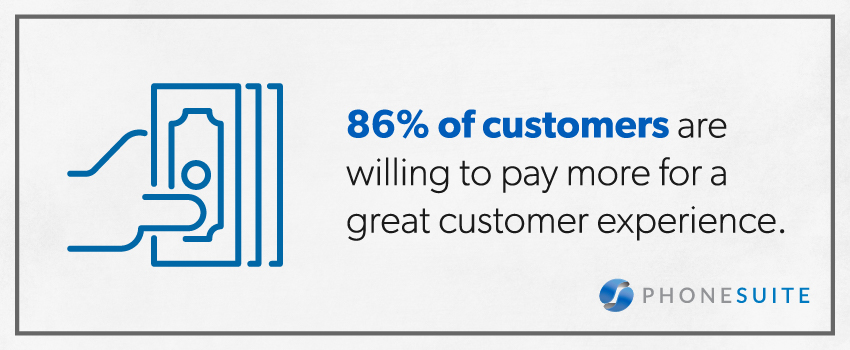
What Do Hotels Need in a PBX Phone System?
When selecting an IP PBX phone system for their property, hotels should consider the following features to ensure efficient operations and exceptional guest experiences:
Integrations
Since VoIP phone systems leverage internet connectivity, they can seamlessly integrate with various internet-based tools and applications. Hotels should prioritize systems that can integrate with their CRM, PMS, and other communication channels, enabling a cohesive and streamlined communication flow.
Intelligent Call Routing
Intelligent call routing efficiently connects calls to the appropriate department or staff member. Hotels can configure call routing based on schedule to ensure calls are directed to the right personnel during business hours or off-hours.
Ring Groups
Ring groups allow multiple phones to ring simultaneously until one is answered, ensuring that guest requests and inquiries are promptly addressed, even during peak periods.
Emergency Calls
In case of emergencies, the phone system should immediately notify the front desk when guests call emergency numbers, enabling a quick response and ensuring guest safety.
In-Room Features
With 86% of customers willing to pay more for a great customer experience,2 providing features that enhance their stay is critical. In-room features like wake-up calls, do-not-disturb mode, and the ability to update room status by dialing a code from the guest room can significantly improve guest experiences and streamline hotel operations.
Administrative Features
A user-friendly administrative interface that simplifies self-service tasks, such as adding or removing users, monitoring usage, and managing account settings, can greatly improve operational efficiency.
Security
As VoIP hotel phone systems handle sensitive guest information, prioritizing security is essential. Properties should choose reputable hotel phone system providers with comprehensive security measures to prevent unauthorized access and protect guest data.
What Is a Cloud Hotel Phone System?
A cloud hotel phone system is a modern alternative to traditional on-premises PBX systems. Instead of requiring physical hardware installed at the hotel, the entire system is hosted in the cloud and delivered over the internet by a phone system provider. This provider manages the infrastructure, maintenance, and updates, allowing hotels to focus on operations and guest experience without worrying about technical upkeep.
Benefits of a Cloud Hotel Phone System
Cost-Effective
Cloud systems operate on a subscription-based model, eliminating the need for expensive hardware purchases and reducing ongoing maintenance costs.
Scalable
Hotels can quickly scale their phone systems up or down based on seasonal occupancy or business growth—without the hassle of hardware upgrades.
Ease of Use
Modern cloud-based phone systems are designed to simplify and streamline hotel operations. This is especially important as 64% of hotels plan to adopt new technologies to attract and retain staff in 2025.
Remote Management
Hotel staff or IT teams can manage and configure the system remotely, making it easy to adjust settings, update features, or manage users from any location.
Built-In Disaster Recovery
Because communications data is stored in the cloud, hotels benefit from built-in disaster recovery. This ensures business continuity even in the face of natural disasters or unexpected disruptions.
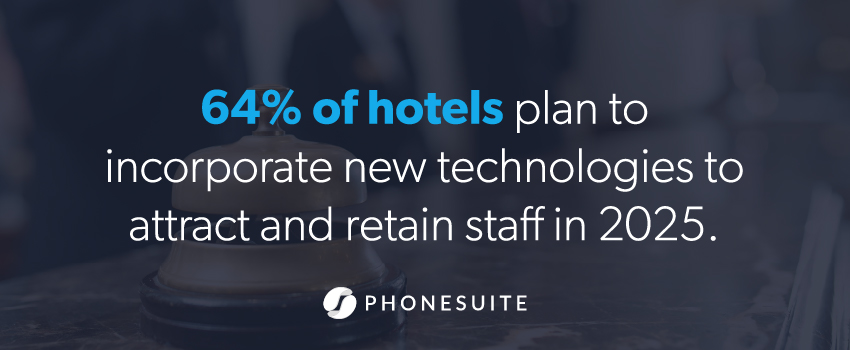
Key Features of Hotel Phone Systems
When evaluating cloud hotel phone system providers, properties should consider the following key features:
Auto Attendant
An automated voice system streamlines call handling by directing incoming calls to the correct department or extension based on pre-configured menus and voice prompts. This feature increases efficiency by eliminating the need for a dedicated operator, ensuring calls are routed correctly from the outset. Additionally, auto attendants can provide basic information to callers, such as business hours, directions, or frequently requested details, to reduce the burden on front desk staff.
PMS Integration
Seamless integration between the hotel phone system and the PMS is vital for efficient operations. Upon guest check-in, the PMS automatically updates the hotel phone system with the guest’s information, enabling personalized caller ID and ensuring the guest’s room extension is activated for outgoing and incoming calls. When guests check out, the PMS notifies the phone system to deactivate the room extension and clear any associated voicemail or call logs.
Call Recording
Call recording enables quality assurance by allowing supervisors to monitor and evaluate staff interactions with guests, ensuring consistent service standards. Additionally, hotels can leverage recorded calls for training purposes to help new employees learn best practices. If a dispute or misunderstanding occurs, recorded calls also provide a reliable record for resolution.
Voicemail-to-Email
Voicemail-to-email transcribes voicemail messages into text and delivers them as email attachments or inline messages. By eliminating the need to check a separate voicemail system, staff can manage messages more easily, prioritize follow-ups, and respond promptly to guest requests. Voicemail-to-email also allows remote access to messages via mobile devices, so staff can stay connected even when away from a desk phone.
Ring Groups and Call Queues
Hotels often experience high call volumes during peak periods, which can lead to missed calls and frustrated guests. Advanced call management features like ring groups and call queues address this challenge by distributing incoming calls to available staff members or placing callers in a virtual queue. Ring groups simultaneously ring multiple extensions until one is answered, while call queues hold callers in a queue and provide estimated wait times to ensure no call goes unanswered.
Mobile Integration
Hotel staff members are often on the move, attending to guest needs throughout the property. Mobile integration enables staff to make and receive calls from their mobile devices as if they were using a desk phone. This feature ensures that staff remain accessible and responsive, regardless of their location, improving guest service and internal communication.
Contactless Check-In/Check-Out
Over half (54%) of travelers said contactless check-in and check-out were the features they’d most like to see implemented at hotels.4 Cloud-based hotel phone systems enable guests to complete the check-in and check-out process without interacting with front desk staff, enhancing convenience and reducing potential touch points.
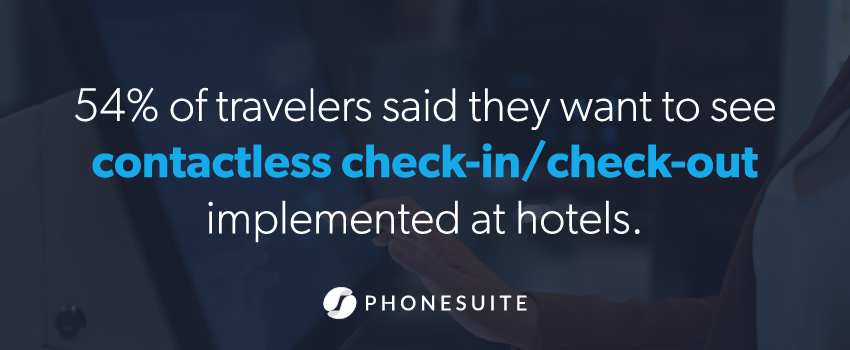
Conference Calling
Conference calling allows multiple participants to join voice and video calls, enabling real-time communication, decision-making, and problem-solving. This feature streamlines internal coordination and can also be used for virtual meetings with vendors, partners, or corporate offices.
Collaboration Tools
Effective teamwork and coordination are essential for delivering streamlined guest experiences. A hotel phone system can integrate collaboration tools that facilitate real-time communication, file sharing, and task management among staff members. These tools may include instant messaging, video calls, shared calendars, and project management features, encouraging teams to stay connected, aligned, and responsive to guest needs or operational requirements.
IVR (Interactive Voice Response)
An IVR system provides a self-service option for guests, allowing them to access information or navigate to the appropriate department by following voice prompts and menus. This feature can reduce the workload on front desk staff by handling routine inquiries, such as requests for directions or restaurant reservations. Additionally, IVR systems can be integrated with the PMS, enabling guests to check room status, make reservations, or update their room service preferences through a voice interface.
Multi-Language Support
For hotels that cater to guests from diverse cultural backgrounds, multi-language support facilitates effective communication by providing voice prompts, menus, and messaging in multiple languages. This feature can also be extended to staff members, enabling them to communicate with guests in their preferred language and fostering a more personalized and inclusive environment.
Reporting and Analytics
Reporting and analytics capabilities provide hotels with valuable insights into their phone system usage, performance metrics, and areas for improvement. Detailed call records, including call duration, source, and destination, allow hotels to monitor staff productivity and identify potential bottlenecks or inefficiencies. Usage statistics and performance metrics can also inform data-driven decisions, such as staffing levels, training needs, or system upgrades, to ensure optimal utilization and return on investment.
Modernize Your Hotel Phone System With Phonesuite
By investing in a modern hotel phone system, properties can unlock a wealth of benefits that not only enhance guest satisfaction but also drive operational efficiency and cost savings. From seamless PMS integration and intelligent call routing to advanced features like voicemail-to-email and call recording, the right hotel phone system empowers staff to deliver exceptional service while optimizing internal communication and coordination.
Phonesuite knows the hospitality industry, and we designed our hotel phone system solutions to solve the unique challenges modern hotel businesses face. Whether your property is boutique, luxury, economy, or even a resort, you can count on us to deliver a phone system that meets all your needs and integrates with your technology. Trust Phonesuite to deliver:
- Cloud hotel phone system solutions that eliminate expensive infrastructure and free your staff from the front desk.
- PBX phone system solutions that incorporate seamlessly into your existing setup so you can use the you already have.
Ready to get started with a hotel phone system that modernizes your communications? Reach out to Phonesuite today to get started.
Real-World Use Cases for Hotel Phone Systems
Here’s how hotels of various sizes and types benefit from purpose-built phone systems:
Boutique Hotel (40 Rooms)
A cloud-based phone system allowed staff to manage calls remotely during off-hours, while PMS integration enabled automatic check-in/out call routing and reduced front desk workload by 25%.
Luxury Resort
The resort implemented a PBX system with multilingual IVR, supporting guests in five languages. Room service calls were automatically routed to the kitchen during peak hours, cutting down service wait times by 40%.
Multi-Property Hotel Chain
A centralized cloud phone system enabled unified management across four properties. IT could handle configurations and support from a single dashboard, improving response time and reducing on-site maintenance costs.
These real-world examples show how the right hotel phone system enhances service, lowers operational friction, and adapts to diverse hotel environments.
Hotel Phone Systems FAQs
Can I keep my current hardware with a new phone system?
Yes. Many hotels choose VoIP or hybrid systems that allow them to retain existing handsets while gaining cloud functionality and features.
What’s the difference between a PBX and a cloud phone system?
PBX systems can be on-premises or VoIP-based, and they offer internal call routing and extensions. Cloud systems are hosted off-site and offer more flexibility, remote management, and cost efficiency.
How secure is a cloud hotel phone system?
Leading providers like Phonesuite offer strong encryption, access controls, and compliance with E911, PCI, and data protection regulations to keep guest information secure.
Can the phone system integrate with our PMS and CRM?
Absolutely. Phonesuite systems are designed for seamless integration with your hotel’s PMS, CRM, and other technologies to streamline operations.
Is a hotel phone system still necessary with mobile apps?
Yes. Phone systems ensure reliable communication, especially during emergencies or outages. They also provide a consistent, accessible channel for all guests, regardless of tech comfort level.
Sources:
- https://hoteltechnologynews.com/2022/03/research-78-of-hoteliers-will-increase-their-investment-in-hotel-technology-in-the-next-three-years/
- https://www.syniverse.com/blog/messaging/communication-trends-in-the-travel-and-hospitality-industry/
- https://skift.com/wp-content/uploads/2022/06/Hospitality-Industry-Trends-for-2025-Oracle-and-Skift-1.pdf
